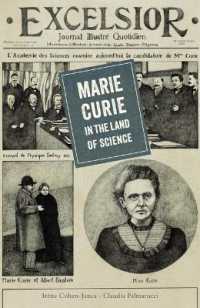- ホーム
- > 洋書
- > 英文書
- > History / World
Full Description
When the Nazis seized power in Germany in 1933 they promised to create a new, harmonious society under the leadership of the F^uuml^hrer, Adolf Hitler. The concept of Volksgemeinschaft - 'the people's community' - enshrined the Nazis' vision of society'; a society based on racist, social-Darwinist, anti-democratic, and nationalist thought. The regime used Volksgemeinschaft to define who belonged to the National Socialist 'community' and who did not. Being accorded the status of belonging granted citizenship rights, access to the benefits of the welfare state, and opportunities for advancement, while these who were denied the privilege of belonging lost their right to live. They were shamed, excluded, imprisoned, murdered.
Volksgemeinschaft was the Nazis' project of social engineering, realized by state action, by administrative procedure, by party practice, by propaganda, and by individual initiative. Everyone deemed worthy of belonging was called to participate in its realization. Indeed, this collective notion was directed at the individual, and unleashed an enormous dynamism, which gave social change a particular direction. The Volksgemeinschaft concept was not strictly defined, which meant that it was rather marked by a plurality of meaning and emphasis which resulted in a range of readings in the Third Reich, drawing in people from many social and political backgrounds.
Visions of Community in Nazi Germany scrutinizes Volksgemeinschaft as the Nazis' central vision of community. The contributors engage with individual appropriations, examine projects of social engineering, analyze the social dynamism unleashed, and show how deeply private lives were affected by this murderous vision of society.
Contents
Preface
Glossary
1: Martina Steber and Bernhard Gotto: Volksgemeinschaft: Writing the Social History of the Nazi Regime
Part I: Volksgemeinschaft: Controversies
2: Ian Kershaw: Volksgemeinschaft: Potential and Limitations of the Concept
3: Michael Wildt: Volksgemeinschaft: A Modern Perspective on National Socialist Society
4: Ulrich Herbert: Echoes of the Volksgemeinschaft
Part II: A New Frame of Reference: Ideology, Administrative Practices, and Social Control
5: Lutz Raphael: Pluralities of National Socialist Ideology: New Perspectives on the Production and Diffusion of National Socialist Weltanschauung
6: Armin Nolzen: The NSDAP's Operational Codes after 1933
7: Thomas Schaarschmidt: Mobilizing German Society for War: The National Socialist Gaue
8: Jane Caplan: Registering the Volksgemeinschaft: Civil Status in Nazi Germany 1933-9
9: Gerhard Wolf: Exporting Volksgemeinschaft: The Deutsche Volksliste in Annexed Upper Silesia
Part III: The Individual and the Regime: The Promises of Volksgemeinschaft
10: Andreas Wirsching: Volksgemeinschaft and the Illusion of 'Normality' from the 1920s to the 1940s
11: Birthe Kundrus: Greasing the Palm of the Volksgemeinschaft? Consumption under National Socialism
12: Nicole Kramer: Volksgenossinnen on the German Home Front: An Insight into Nazi Wartime Society
13: Frank Bajohr: 'Community of Action' and Diversity of Attitudes: Reflections on Mechanisms of Social Integration in National Socialist Germany, 1933-45
14: Rüdiger Hachtmann: Social Spaces of the Nazi Volksgemeinschaft in the Making: Functional Elites and Club Networking
Part IV: Volksgemeinschaft: A Rationale for Violence
15: Christopher R. Browning: The Holocaust: Basis and Objective of the Volksgemeinschaft?
16: Sven Keller: Volksgemeinschaft and Violence: Some Reflections on Interdependencies
17: Detlef Schmiechen-Ackermann: Social Control and the Making of the Volksgemeinschaft
Part V: The Limits of Volksgemeinschaft Policies
18: Johannes Hürter: The Military Elite and Volksgemeinschaft
19: Willi Oberkrome: National Socialist Blueprints for Rural Communities and their Resonance in Agrarian Society
20: Richard Bessel: The End of the Volksgemeinschaft
Bibliography







